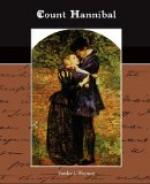Tignonville found voice at last. “Have they—killed the Admiral?” he muttered, his eyes on the table.
“M. Coligny? An hour ago.”
“And Teligny?”
“Him also.”
“M. de Rochefoucauld?”
“They are dealing with M. le Comte now, I believe,” Tavannes answered. “He had his chance and cast it away.” And he began to eat.
The man at the table shuddered. The woman continued to look before her, but her lips moved as if she prayed. Suddenly a rush of feet, a roar of voices surged past the window; for a moment the glare of the torches, which danced ruddily on the walls of the room, showed a severed head borne above the multitude on a pike. Mademoiselle, with a low cry, made an effort to rise, but Count Hannibal grasped her wrist, and she sank back half fainting. Then the nearer clamour sank a little, and the bells, unchallenged, flung their iron tongues above the maddened city. In the east the dawn was growing; soon its grey light would fall on cold hearths, on battered doors and shattered weapons, on hordes of wretches drunk with greed and hate.
When he could be heard, “What are you going to do with us?” the man asked hoarsely.
“That depends,” Count Hannibal replied, after a moment’s thought.
“On what?”
“On Mademoiselle de Vrillac.”
The other’s eyes gleamed with passion. He leaned forward.
“What has she to do with it?” he cried. And he stood up and sat down again in a breath.
Tavannes raised his eyebrows with a blandness that seemed at odds with his harsh visage.
“I will answer that question by another question,” he replied. “How many are there in the house, my friend?”
“You can count.”
Tavannes counted again. “Seven?” he said. Tignonville nodded impatiently.
“Seven lives?”
“Well?”
“Well, Monsieur, you know the King’s will?”
“I can guess it,” the other replied furiously. And he cursed the King, and the King’s mother, calling her Jezebel.
“You can guess it?” Tavannes answered; and then with sudden heat, as if that which he had to say could not be said even by him in cold blood, “Nay, you know it! You heard it from the archer at the door. You heard him say, ’No favour, no quarter for man, for woman, or for child. So says the King.’ You heard it, but you fence with me. Foucauld, with whom his Majesty played to-night, hand to hand and face to face—Foucauld is dead! And you think to live? You?” he continued, lashing himself into passion. “I know not by what chance you came where I saw you an hour gone, nor by what chance you came by that and that”—pointing with accusing finger to the badges the Huguenot wore. “But this I know! I have but to cry your name from yonder casement, nay, Monsieur, I have but to stand aside when the mob go their rounds from house to house, as they will go presently, and you will perish as certainly as you have hitherto escaped!”




